新初中英语语法知识—情态动词的知识点训练(2)
初中英语语法之情态动词用法及练习题(含答案)
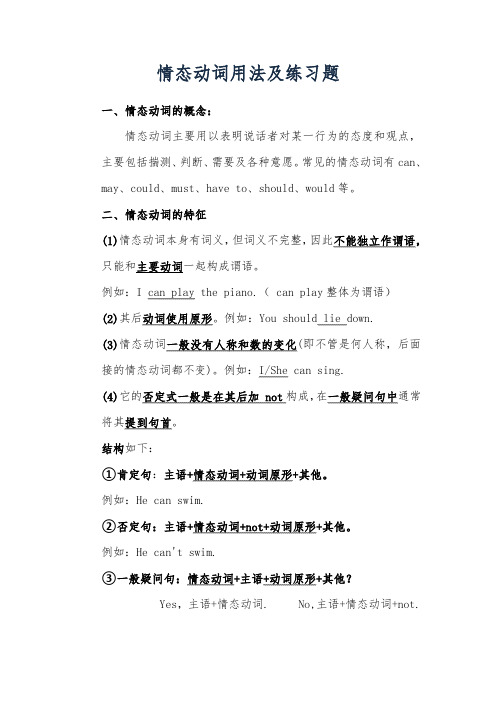
情态动词用法及练习题一、情态动词的概念:情态动词主要用以表明说话者对某一行为的态度和观点,主要包括揣测、判断、需要及各种意愿。
常见的情态动词有can、may、could、must、have to、should、would等。
二、情态动词的特征(1)情态动词本身有词义,但词义不完整,因此不能独立作谓语,只能和主要动词一起构成谓语。
例如:I can play the piano.( can play整体为谓语)(2)其后动词使用原形。
例如:You should lie down.(3)情态动词一般没有人称和数的变化(即不管是何人称,后面接的情态动词都不变)。
例如:I/She can sing.(4)它的否定式一般是在其后加 not构成,在一般疑问句中通常将其提到句首。
结构如下:①肯定句:主语+情态动词+动词原形+其他。
例如:He can swim.②否定句:主语+情态动词+not+动词原形+其他。
例如:He can't swim.③一般疑问句:情态动词+主语+动词原形+其他?Yes,主语+情态动词. No,主语+情态动词+not.例如:-Can he swim?-Yes, he can. No,he can’t.④特殊疑问句:特殊疑问词+情态动词+主语+动词原形+其他? 例如: -What can he do ?-He can swim.三.情态动词的用法(1)can的用法①表示“能力”Can you sing?你会唱歌吗?②表示客观条件允许You can listen to music here.你可以在这里听音乐。
You can’t park your car here. 你不能在此停车③can用在否定句和疑问句中时,有时表示说话人的怀疑、惊异、或猜测:It can’t be true.这不可能是事实Can it be true?这可能是真的吗?④.can的搭配用法:A.as +adj./adv.+as one can/could “尽可能,尽量……”,如:The man took his child to the hospital as quickly as he could.这个男人尽可能快地将孩子送去医院。
情态动词用法总结及相应练习

情态动词用法总结及相应练习在英语中,情态动词属于助动词。
除了作简略回答外,它们一般不能单独使用,它们必须与动词原形一起使用构成句子的谓语。
不同的情态动词会有不同的意义和用法。
有时,同一个情态动词在不同的语境中也会产生不同的含义。
下面我们将讨论这些情态动词的用法。
情态动词的推测性用法和非推测性用法情态动词一般有两种用法:推测性用法(epistemic use)和非推测性用法(non-epistemic use)。
推测性用法是指做出推测,预测事物发生的可能性;非推测性用法则指情态动词本身的基本含义,如XXX表示能力,may表示许可,must和should表示必须和义务,need 表示需要等。
例如:I can swim。
(非推测性用法)This can be true。
(推测性用法)You may go now。
(非推测性用法)He may be ill now。
(推测性用法)You must finish it before lunch time。
(非猜测性用法)He must be at home for he never goes out at dinner time。
(推测性用法)我们把英语中的9大神态动词按其猜测性和非猜测性用法列表如下:情态动词非推测性用法推测性用法can/could能力/许可(ability/n)可能(possibility)may/might许可(n)可能(possibility)will/would意愿(n)预言性(predictability)XXX责任和义务(n)应该是(logical necessity)must责任和任务(n)一定,一定(logical necessity)神态动词非猜测性用法的申明1.may和might透露表现允许may能够与分歧的人称搭配,透露表现“答应、允许”。
比方:May I know your name?You may be the first to leave if you are in a hurry。
最新版-英语情态动词专项复习

we can see his name on it .
7
4. need (需要) 既可做实义动词也可做情态动词 1)实义动词 need to do sth 需要做某事
Eg: I need to buy a big house . --- Do you need to buy a big house ? --- Yes , I do . No, I don’t . He needs to borrow a map . --- Does he need to borrow a map ?
Yes ,you may. No, you mustn’t. No, you can’t.
Yes, you must. No, you needn’t. No you don’t have to
Yes, you must. No, you needn’t
1.Must I take the keyboard to the office now ?
2) 情态动词 need do sth 需要做某事 Eg: I need buy a big house .
8
5. have to
不得不
Eg: It’s eleven o’clock . I have to go now .
He has to finish the work first .
请注意: I don’t have to go now .
--No, you __C___.Tomorrow is Saturday .You
may get up later.
A mustn’t
初中英语语法知识—动词的专项训练解析含答案(2)

一、选择题1.—Would you like to try some pizza?—Yes, please. It lovely and nice.A.sounds, sees B.looks, smells C.hears, turns D.sounds, watches 2.Colours can change our moods and make us happy or sad .A.feel B.to feelC.felt D.feeling3.The strawberries delicious. You can have a try.A.eat B.drink C.taste D.sound 4.Parents always hope their children a happy and healthy life.A.to live B.can live C.living D.should live 5.Coffee is ready. How nice it ______! Would you like some?A.looks B.smells C.sounds D.feels6.I don’t have a baseball, but AlanA.do B.does C.have D.has7.What kind of music ________ he ________?A.does; listen B.does; listen to C.is; listen D.is; listen to 8.My mother with me ________ at my grandma’s home ________that snowy night. A.were, at B.was, at C.was, on9.Lucy and I ________ good friends.A.am B.is C.are10.—Why ______ you so busy these days?—Because they arrived ______ London ______ the morning of July1.A.are; in , in B.are; in , on C.do; on , in D.do; at , on 11.I think the music is great , and it is worth________A.to listen B.to listen to C.listening D.listening to 12.—Do you like watching cooking programs on TV?—No, I don’t , but my twin brother . He's very fond of cooking.A.does B.do C.is D.are 13.What a beautiful song! It ___________so sweet.A.feels B.sounds C.tastes D.smells 14.— Tom in the library?—Yes,and his friends Eric and Dale in the library,too.A.Is;are B.Is;is C.Are;is15.—________ you Mary? —Yes, I ________.A.Are; is B.Is; am C.Are; am D.Am; is16.—Do you know whom they will have ________the parts of car together?—Sorry,I have no idea.A.fix B.fixed C.to fix D.fixing17.I don't have a Ping-Pong ball, _______ my brother _______.A.but; do B.and; does C.and;do D.but; does18.Li Ming's father __________want __________the new coat.A.doesn't; buy B.don't; to buy C.don't; buy D.doesn't; to buy 19.Our teachers always make us ________ a lot of homework.A.to do B.do C.does D.doing20.— How ________ your trip to Australia?—Great. I’ll go there again next year.A.was B.is C.are D.were21.— How sweet the flowers _____ in spring!— Yes, many tourists come to enjoy them every day.A.taste B.smell C.feel22.The air _______ fresh after the rain. And the sky is blue.A.feels B.tastes C.smells D.sounds23.I like this dress very much. It soft and smooth.A.feels B.touches C.is felt D.is touched 24.2019 has come. I hope everyone can make his dream ________.A.came true B.come true C.comes true D.coming true 25.—William, your hat _______ nice.—Thanks.A.buys B.looks C.finds【参考答案】***试卷处理标记,请不要删除一、选择题1.B解析:B【解析】【分析】【详解】句意:——你想尝尝披萨吗?——好的,请。
(完整word版)初中英语情态动词详细用法归纳(含练习及答案)(直接打印版),推荐文档
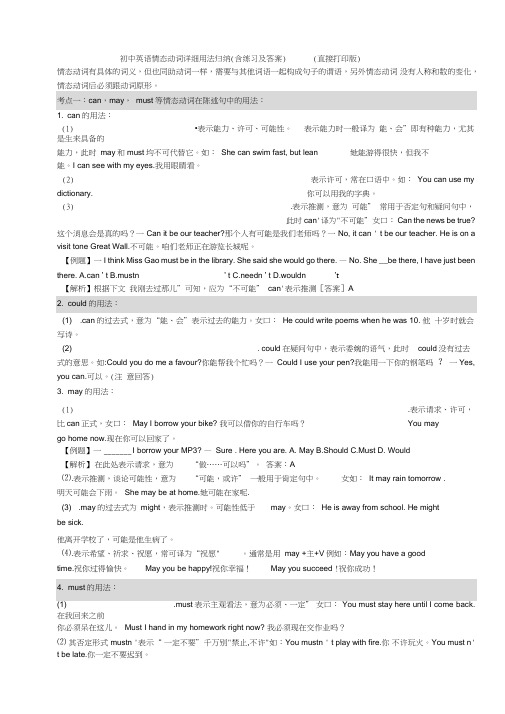
初中英语情态动词详细用法归纳(含练习及答案) (直接打印版)情态动词有具体的词义,但也同助动词一样,需要与其他词语一起构成句子的谓语,另外情态动词没有人称和数的变化,情态动词后必须跟动词原形。
1. can的用法:(1)•表示能力、许可、可能性。
表示能力时一般译为能、会”即有种能力,尤其是生来具备的能力,此时may和must均不可代替它。
如:She can swim fast, but lean 她能游得很快,但我不能。
I can see with my eyes.我用眼睛看。
(2)表示许可,常在口语中。
如:You can use my dictionary. 你可以用我的字典。
(3).表示推测,意为可能” 常用于否定句和疑问句中,此时can'译为"不可能”女口:Can the news be true?这个消息会是真的吗?一Can it be our teacher?那个人有可能是我们老师吗?一No, it can ' t be our teacher. He is on a visit tone Great Wall.不可能。
咱们老师正在游览长城呢。
【例题】一I think Miss Gao must be in the library. She said she would go there. —No. She __be there, I have just beenthere. A.can ' t B.mustn ' t C.needn ' t D.wouldn 't【解析】根据下文我刚去过那儿”可知,应为“不可能” can'表示推测[答案]A(1) .can的过去式,意为“能、会”表示过去的能力。
女口:He could write poems when he was 10. 他十岁时就会写诗。
(2) . could在疑问句中,表示委婉的语气,此时could没有过去式的意思。
语法专题八 情态动词【考点精讲精练】-2023年中考语法一点通(学生版)

考点精讲情态动词表示讲话人的态度、请求、许可、愿望、可能等。
本身具有一定的意义,但不能独立作谓语,没有人称和数的变化,且后面必须跟动词原形。
常考的情态动词有:can/could(能够,可以),may/might(可能,可以),must(必须,一定),should(应该),need(必要),have to(不得不)等。
Need用作情态动词时常用于否定句和疑问句,need还可作实意动词,常用结构need to do sth.考点1.情态动词+动原➢He can play the violin. 他会拉小提琴。
➢It might snow tomorrow. 明天可能下雪。
➢We should respect everyone. 我们应该尊重每一个人。
考点2.常考的一般疑问句的回答—Can you swim?—Yes, I can. /No, I can’t.—May I smoke here?—Yes, you may/can. /Sure. / Certainly. / Of course. /No, you mustn't / can’t.—Must we finish the work at once?—Yes,you must. /No,you needn't. / No,you don't have to.(must引导的一般疑问句的否定回答是常考点)考点3.must必须(强调主观看法)mustn’t表示禁止,不允许➢You must study harder this term. 你们这学期必须更加努力学习。
(说话者的个人看法)➢You mustn’t swim in the river. 你们千万不能去河里游泳。
(这条河禁止游泳)考点4.情态动词表推测表推测:由强到弱肯定:must 准是,一定can 可能could(可能)may (或许) might(大概)否定:can’t 不可能may/ might not 或许不能can 和could 表示推测,can 表示推测时,往往用于否定句和疑问句。
情态动词总结知识点
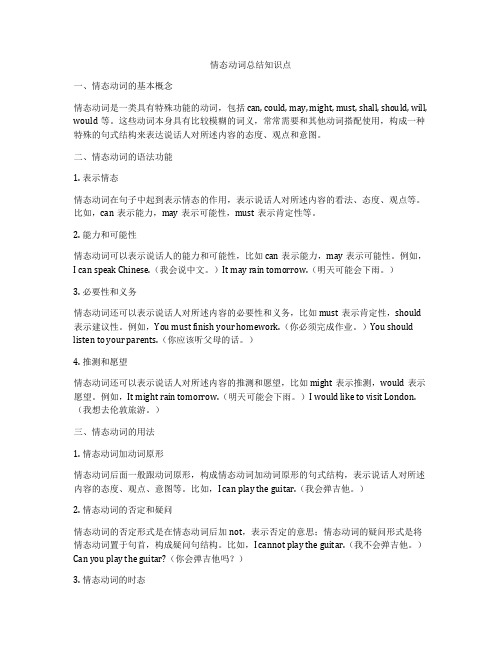
情态动词总结知识点一、情态动词的基本概念情态动词是一类具有特殊功能的动词,包括can, could, may, might, must, shall, should, will, would等。
这些动词本身具有比较模糊的词义,常常需要和其他动词搭配使用,构成一种特殊的句式结构来表达说话人对所述内容的态度、观点和意图。
二、情态动词的语法功能1. 表示情态情态动词在句子中起到表示情态的作用,表示说话人对所述内容的看法、态度、观点等。
比如,can表示能力,may表示可能性,must表示肯定性等。
2. 能力和可能性情态动词可以表示说话人的能力和可能性,比如can表示能力,may表示可能性。
例如,I can speak Chinese.(我会说中文。
)It may rain tomorrow.(明天可能会下雨。
)3. 必要性和义务情态动词还可以表示说话人对所述内容的必要性和义务,比如must表示肯定性,should 表示建议性。
例如,You must finish your homework.(你必须完成作业。
)You should listen to your parents.(你应该听父母的话。
)4. 推测和愿望情态动词还可以表示说话人对所述内容的推测和愿望,比如might表示推测,would表示愿望。
例如,It might rain tomorrow.(明天可能会下雨。
)I would like to visit London.(我想去伦敦旅游。
)三、情态动词的用法1. 情态动词加动词原形情态动词后面一般跟动词原形,构成情态动词加动词原形的句式结构,表示说话人对所述内容的态度、观点、意图等。
比如,I can play the guitar.(我会弹吉他。
)2. 情态动词的否定和疑问情态动词的否定形式是在情态动词后加not,表示否定的意思;情态动词的疑问形式是将情态动词置于句首,构成疑问句结构。
比如,I cannot play the guitar.(我不会弹吉他。
情态动词全部知识点总结
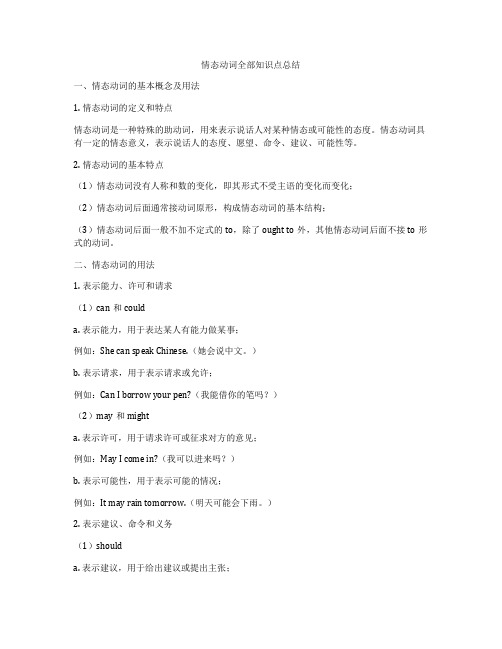
情态动词全部知识点总结一、情态动词的基本概念及用法1. 情态动词的定义和特点情态动词是一种特殊的助动词,用来表示说话人对某种情态或可能性的态度。
情态动词具有一定的情态意义,表示说话人的态度、愿望、命令、建议、可能性等。
2. 情态动词的基本特点(1)情态动词没有人称和数的变化,即其形式不受主语的变化而变化;(2)情态动词后面通常接动词原形,构成情态动词的基本结构;(3)情态动词后面一般不加不定式的to,除了ought to外,其他情态动词后面不接to形式的动词。
二、情态动词的用法1. 表示能力、许可和请求(1)can和coulda. 表示能力,用于表达某人有能力做某事;例如:She can speak Chinese.(她会说中文。
)b. 表示请求,用于表示请求或允许;例如:Can I borrow your pen?(我能借你的笔吗?)(2)may和mighta. 表示许可,用于请求许可或征求对方的意见;例如:May I come in?(我可以进来吗?)b. 表示可能性,用于表示可能的情况;例如:It may rain tomorrow.(明天可能会下雨。
)2. 表示建议、命令和义务(1)shoulda. 表示建议,用于给出建议或提出主张;例如:You should see a doctor.(你应该去看医生。
)b. 表示义务,用于表示责任或义务;例如:We should obey the law.(我们应该遵守法律。
)(2)ought toa. 表示责任或义务,用于表示应该做的事情;例如:You ought to apologize to her.(你应该向她道歉。
)3. 表示可能性和必然性(1)musta. 表示必然性,用于表示肯定的推断或必然的结论;例如:He must be at home now.(他现在一定在家。
)b. 表示义务,用于表示应遵守的规定或责任;例如:Students must wear school uniforms.(学生必须穿校服。
情态动词英语语法知识点

情态动词英语语法知识点情态动词,本身有一定的词义,表示语气的单词。
但是不能独立作谓语,只能和动词原形一起构成谓语。
这次小编给大家整理了情态动词英语语法知识点,供大家阅读参考。
1 情态动词的语法特征1) 情态动词不能表示正在发生或已经发生的事情,只表示期待或估计某事的发生。
2) 情态动词除 ought 和 have 外,后面只能接不带 to 的不定式。
3) 情态动词没有人称,数的变化,即情态动词第三人称单数不加-s。
4) 情态动词没有非谓语形式,即没有不定式,分词,等形式。
1 情态动词的语法特征1) 情态动词不能表示正在发生或已经发生的事情,只表示期待或估计某事的发生。
2) 情态动词除 ought 和 have 外,后面只能接不带 to 的不定式。
3) 情态动词没有人称,数的变化,即情态动词第三人称单数不加-s。
4) 情态动词没有非谓语形式,即没有不定式,分词,等形式。
2 比较 can 和 be able to1)can could 表示能力;可能 (过去时用 could),只用于现在式和过去式(could)。
be able to 可以用于各种时态。
They will be able to tell you the news soon. 他很快就能告诉你消息了。
2)只用 be able toa. 位于助动词后。
b. 情态动词后。
c. 表示过去某时刻动作时。
d. 用于句首表示条件。
e. 表示成功地做了某事时,只能用 was/were able to,不能用 could。
He was able to flee Europe before the war broke out. = He managed to flee Europe before the war broke out.注意:could 不表示时态1)提出委婉的请求, (注意在回答中不可用 could)。
--- Could I have the television on?--- Yes, you can. / No, you can't.2)在否定,疑问句中表示推测或怀疑。
初中知识点归纳情态动词的特殊用法与句型转换
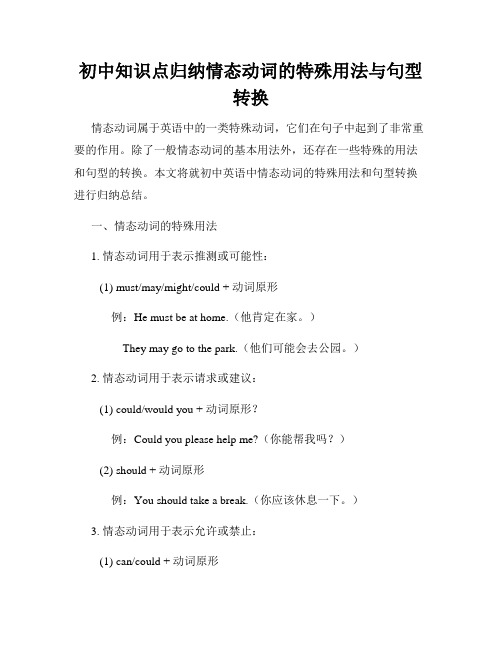
初中知识点归纳情态动词的特殊用法与句型转换情态动词属于英语中的一类特殊动词,它们在句子中起到了非常重要的作用。
除了一般情态动词的基本用法外,还存在一些特殊的用法和句型的转换。
本文将就初中英语中情态动词的特殊用法和句型转换进行归纳总结。
一、情态动词的特殊用法1. 情态动词用于表示推测或可能性:(1) must/may/might/could + 动词原形例:He must be at home.(他肯定在家。
)They may go to the park.(他们可能会去公园。
)2. 情态动词用于表示请求或建议:(1) could/would you + 动词原形?例:Could you please help me?(你能帮我吗?)(2) should + 动词原形例:You should take a break.(你应该休息一下。
)3. 情态动词用于表示允许或禁止:(1) can/could + 动词原形例:You can go now.(你可以走了。
)(2) must/mustn't + 动词原形例:You must finish your homework.(你必须完成作业。
)4. 情态动词用于表示能力或可能性:(1) can/could + 动词原形例:She can swim very well.(她游泳游得很好。
)(2) be able to + 动词原形例:He will be able to speak English fluently.(他将能够流利地说英语。
)5. 情态动词用于表示意愿或命令:(1) will/would + 动词原形例:I will do my best.(我会尽力的。
)(2) shall/should + 动词原形例:You shall obey the rules.(你应该遵守规则。
)二、句型转换1. 肯定句转否定句:将情态动词的原形后加上not。
初中英语中考情态动词考点及练习

情态动词情态动词又叫情态助动词;它们具有以下特点:⑴它们必须与其他动词连用,即:情态动词+动词原形表示说话人对所述动作的看法,如需要、可能、意愿或怀疑等;⑵绝大多数情态动词没有人称和数的变化,即第三人称单数不加-s以be和have 开头的情态动词短语除外;⑶在意义上,情态动词具有“多义性”;例:can既可表示能力,又可表示可能、允许等意义;情态动词的基本用法1. can的基本用法:⑴表示体力或智力上的能力,即“能够,会”,可与be able to转换;例:He can speak English. = He is able to speak English.—Can you play basketball— No, I can’t.如果表示将来具备的能力,要用will be able to;例:If I have a good sleep, I will be able to do the problem.⑵表示许可,主要用于口语,书面语一般用may;例:—Can we go home now, please— No, you can’t.You can only smoke in this room.You can’t keep the library books for more than a month.⑶表示“可能”,与may同义,但一般用在疑问句中;例:What can he possibly want在否定句中,否定形式can’t表示推测“不大可能”;例:Anybody can make mistakes.The news can’t be true.与第一、二人称连用时,还可以就可能的解决问题的方式或可能的行为提出建议;在这里,也可用could使语气婉转;例:Can / Could we meet again next week 下周我们可以再见面吗—What shall we do 我们怎么办呢— We can / could try asking Lucy for help.——我们可以请露茜帮忙试试看;You can / could help me with the cooking. 你可以帮我做饭;2. may的基本用法:⑴表示“许可”,用can比较口语化;例:You may / can come if you wish. 如果你想来,你就来;You may not pick flowers in this park. 本公园内不许摘花;may not表示按规定不许可,如果用mustn’t则表示说话人不许可;我可以在这里抽烟吗—;mustn’t表示明确的禁止;⑵;例:It may rain tomorrow. 明天可能会下雨;;注意:如果,通常用例:那会是真的吗他究竟是谁呢⑶注意—Yes, you —No3. must的基本用法:⑴表示必须,强调说话人的主观意志;例:I must go now, or I’ll be late.You must be here by注意:表示“必须“时,must的否定式为或而不是mustn’t;也就是:—Must—Yes, you—No, you例:——No, you .⑵表示推测,一般只用于肯定陈述句,表示非常肯定;例:She didn’t look at me. She must be angry. 她不朝我看,一定是生气了;He is good at English. He must know the word. 他英语好,准知道这个词;You must be Mr. Jones. 想必您就是琼斯先生吧;4. have to的基本用法:have to可视为情态动词,但它与其他情态动词在用法上稍有不同;其他情态动词没有人称和数的变化,而have to却有人称和数的变化,要视主语的不同而变化;例:I / You / We / They have to….He / She / It has to….You don’t have to….意思是“必须,不得不”;have to强调客观需要;例:Sorry, I have to leave now. 对不起,现在我得走了;I’ve got to go to a meeting. 我得去参加一个会议;Will he have to work deep into the night 他将不得不工作到深夜吗5. need的基本用法:need的基本词义是“需要”,它既可作情态动词,又可作实义动词;⑴ need用作情态动词时,只用于否定句和疑问句;它只有一种形式,后接动词原形;例:I don’t believe you need worry. 我相信你没有必要焦急;—Need we go so soon我们需要这么早就去吗— Yes, we must. / No, we needn’t.是的,必须;/不,不必;So I needn’t tell him, need I 所以我不需要告诉他,对吧请比较以下两句话的不同意思:You needn’t buy the coat. 你没有必要买那件外衣;你还没买You needn’t have bought the coat. 你没有必要买这件外衣的;而你⑵My watch needs mending/to be mended. 我的手表需要修理了;We don’t need to work today. = We needn’t work today.Does he need to go right now = Need he go right now6. had better的基本用法:had bette r常略作’d better;现代语法认为它是一个助动词,因为它后接不意思是“最好做某事;还是做某事比较好”;get some sleep. 你最好睡一会儿;You’d better not do that again. 你最好别再做那件事;What had we better do now 我们现在怎么做才好呢, should, would, might表示推测:①.must多用于肯定句中表示把握性极大的推测,意思为“一定、肯定”;如: You have worked hard all day. You must be tired. 你已辛苦工作一整天了,一定累了;The book must be his. His name is on the cover. 这本书一定是他的,封面上写着他的名字;注意 must不表推测时,在肯定句中意思为“必须强调内在的职责”,在否定句中意思为“不许、禁止”,以它开头的疑问句否定回答常用needn’t或don’t doesn’t have to;如:We must obey the traffic rules. 我们必须遵守交通规则;Cars mustn’t be parked here. 此处严禁停车;—Must we hand in the papers this week 我们必须本星期交论文吗—No, you needn’t. 不,你们不必本星期交;②. can / could多用于否定句、疑问句或间上没有差别;用can时不相信的程度更强一些,如:The man under the tree can’t be Tom人不可能是Tom,他已经去英国了;Can it be true that he was fooled by a five-year-old boy 他被一个五岁的孩子愚弄了,这能是真的吗Could this be an excuse 这会不会是个借口How can you be so careless 你怎么这样粗心③.may / might多用来表示把握性不大的推测,意思为“也许、可能”, might比;注意区分“不可能”与“可能;如:Mr. Wang may know Professor Li’s telephone number.王先生也许知道李教授的电话号码;This might be the key Tom has been looking for.这可能就是汤姆一直在找的钥匙;She may not be there today. 今天她可能不在那儿;一、典型例题中考链接1.—Who is the man over there Is it Mr. Li— No, it ______ be him. Mr. Li is much taller.A. mustn’tB. may noC. can’tD. needn’t2.—Must I go with them tomorrow— No,you ______.A. mustn'tB. shouldn'tC. needn'tD. can't3.—______ I take some photos in the hall— No, you ______.A. Can, needn’tB. Must, mustn’tC. Could, won’tD. May, m ustn’t4.—Dad, must I finish my homework today—No, you ________. You may do it tomorrow.A. needn’tB. mustn’tC. don’tD. won’t5.—The lake is said to be dry. Is that true—It , some kids are swimming in it.A. must be trueB. can’t be trueC. may not be true6.—What is your mother going to do this Saturday—I’m not sure. She _____ go to see my grandmother.A. canB. mustC. may7.—Susan has bought a large house with a swimming pool.—It ______ be very expensive. I never even dream about it.A. mustB. mightC. can’tD. shouldn’t8.—Listen Is Professor Johnson giving a report in the hall —No, it be him. He has gone to Japan.A. needn’tB. may notC. mustn’tD. can’t9.—Let’s go to the West Hill Park by taxi.—Oh, it is not far away from here. We _______take a taxi.A. couldn’tB. mustn’tC. needn’tD. can’t10.—Can you play the piano—Yes, I _______. I often practice it on weekends.A. needn’tB. needC. can’tD. can三、课后练习一、用can, may, must, need, have to, had better的适当形式填空:1.You ________________ return the library book on time.2.I ______________ not find the way to the hospital. _______________ youshow me the way3.—________________ I finish the work right now— No, you ________________ not. You ____________ do it later.4.He said he ________________ not come tonight.5.Her mother was ill. She ________________ stay at home and look afterher.6.It’s time for class. You ________________ stop playing football oryou __________be late for class.7.We ________________ start right now, or they would get there first.8.The cloud is lifting, so it ________________ not be a rainy daytomorrow.二、选择填空1.—Do we have to finish our homework this afternoon—Yes, you ________.A. mustB. canC. mayD. need2. —Must I be in hospital for a week, Doctor—No, you . You can go back home tomorrow.’t B.needn’t C. must3. The desk is not dirty. You _______clean it.A. mustn’tB. shouldn’tC. needn’t C. can’t4. —May I watch TV for a while—No, you _______. You have to finish your homework first.A. shouldn’tB. needn’tC. mustn’tD.won’t5.—Is Jessica giving us a speech this evening—No, it ________be her. She________ to Japan.A. mustn’t; has goneB. mustn’t ;has beenC. can’t ;hasgone D. can’t ;has been6. It’s the library So you________ know shouting is no t allowed here.A. canB. mustC. needD. may7. Boys and girls, don’t forget your report . It ______ today.A. can’t finishB. can’t be finishedC. should finishD. should be finished8.—Mr Smith must have been to your home this morning.—No, he ______ ,because he didn’t know my address.A. couldn’tB. can’tC. mustn’tD. may not9. —Must I mop up the window now—No, you________.’t B. can’t C. shouldn’t D. mustn’t10. —Is Lucy knocking at the door—No. It ________ be Lucy. She is in Japan now.A. needn’tB. mustC. can’t11. —Another cup of coffee—No, thanks. I _____ be off. Mary is waiting for me.A. canB. mayC. mustD. might12. —I’m a little tired. Let’s go to t he zoo by taxi.—We take a taxi. It’s not far from here.A. can’tB. mustn’tC. couldn’tD.needn’t13. If the traffic light is red, you ________ cross the road. It’s very dangerous.A. don’tB. mustn’tC. needn’tD.wouldn’t14. —Must I finish watering the flowers now—No, you________.A. mustB. won’tC. needn’tD. can’t15. —I can’t give up smoking, doctor.—For your health, I’m afraid you ________.A. mayB. canC. have toD. must。
2021年初中英语语法知识—情态动词的技巧及练习题附答案(2)
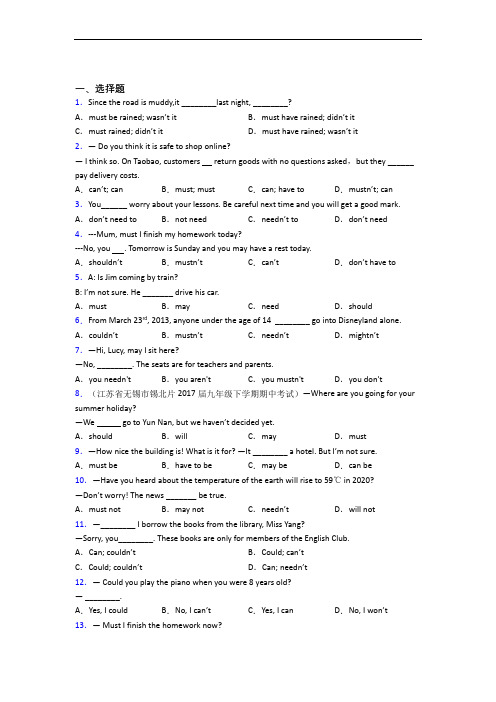
一、选择题1.Since the road is muddy,it ________last night, ________?A.must be rained; wasn’t it B.must have rained; didn’t itC.must rained; didn’t it D.must have rained; wasn’t it2.— Do you think it is safe to shop online?— I think so. On Taobao, customers return goods with no questions asked,but they ______ pay delivery costs.A.can’t; can B.must; must C.can; have to D.mustn’t; can 3.You______ worry about your lessons. Be careful next time and you will get a good mark. A.don’t need to B.not need C.needn’t to D.don’t need4.---Mum, must I finish my homework today?---No, you . Tomorrow is Sunday and you may have a rest today.A.shouldn’t B.mustn’t C.can’t D.don’t have to 5.A: Is Jim coming by train?B: I’m not sure. He _______ drive his car.A.must B.may C.need D.should6.From March 23rd, 2013, anyone under the age of 14 ________ go into Disneyland alone. A.couldn’t B.mustn’t C.needn’t D.mightn’t 7.—Hi, Lucy, may I sit here?—No, ________. The seats are for teachers and parents.A.you needn't B.you aren't C.you mustn't D.you don't 8.(江苏省无锡市锡北片2017届九年级下学期期中考试)—Where are you going for your summer holiday?—We go to Yun Nan, but we haven’t decided yet.A.should B.will C.may D.must9.—How nice the building is! What is it for? —It ________ a hotel. But I’m not sure. A.must be B.have to be C.may be D.can be 10.—Have you heard about the temperature of the earth will rise to 59℃ in 2020?—Don’t worry! The news _______ be true.A.must not B.may not C.needn’t D.will not 11.—________ I borrow the books from the library, Miss Yang?—Sorry, you________. These books are only for members of the English Club.A.Can; couldn’t B.Could; can’tC.Could; couldn’t D.Can; needn’t12.— Could you play the piano when you were 8 years old?— ________.A.Yes, I could B.No, I can’t C.Yes, I can D.No, I won’t 13.— Must I finish the homework now?— .You can do it later.A.No, you needn’t B.Yes, you must C.No, you can’t14.-_________ you help me with my homework?-Of course if I __________.A.Could; could B.Can't; can C.Could; can D.Can; could 15.— Must I go home? — No, you ________.A.can’t B.mustn’t C.don’t D.needn’t 16.–Is Mike coming to the fashion show tomorrow?--I’m not sure. He ______ not come.A.must B.can C.may D.should 17.(2017 • 湖北省宜昌市中考)—Life is becoming convenient with the Internet.—That’s true! Almost everything be done online.A.must B.would C.should D.can 18.—Must I hand in my reports today?—No, you ________.A.mustn’t B.can’t C.shouldn’t D.don’t have to 19.---You look very pretty, if I say so.---Thanks a lot for saying that.A.must B.may C.will D.have to 20.—I often see Maria in the library, and she _________ like reading best.—That’s right.A.need B.may C.must D.can 21.—Could I call you by the first name?—Yes, you .A.will B.could C.may D.might 22.You __ drive your car so fast. It's very dangerous.A.wouldn't B.shouldn't C.couldn't D.mightn't【参考答案】***试卷处理标记,请不要删除一、选择题1.B解析:B【解析】【分析】【详解】句意:由于道路泥泞,昨晚一定下雨了,是吗?考查情态动词表推测以及反意疑问句。
初中英语语法情态动词用法辨析归纳2

初中英语语法:情态动词用法辨析归纳2could have done用法解析英语中 could have done 是一种常见的固定句式,表示“未曾实现的……”,下面将详细介绍下could have done的用法。
一、could have done 表示未曾实现的选择could have done 表示过去本来可以有机会选择做某事,但实际上没有那样做,通常译为“本来可以”。
如:You needn't have typed it twice. You could have used a carbon.你没必要打两遍的,你当时本可以用复写纸打。
You needn't have walked up; you could have taken the lif 你没必要走着上去,你本来可以乘电梯的。
I could have lent you the money. Why didn't you ask me? 我本来可以借这笔钱给你的。
你为什么不向我提出?You needn’t have cooked it. We could have eaten it raw 你其实可以不煮熟(它),我们(本来)可以生吃。
二、could have done 表示未曾实现的想法could have done 表示过去本来有做某事的打算或意图,但实际上没有实现,通常译为“本来可以”。
如:I could have lent you the money. Why didn't you ask me?我本来可以借这笔钱给你的。
你为什么不向我提出?I could have given you some hints, but I suppose you thought yourself too grand.我本可以给你点提示的,但是我认为你太自负了。
三、could have done 表示未实现的可能性could have done 表示过去本来可能发生情况,而实际上没有发生,通常译为“本来可以”“本来可能”等。
情态动词知识点总结

情态动词知识点总结情态动词是英语中的一类特殊动词,用于表达说话人的态度、观点或情感。
情态动词具有一些独特的语法和用法规则,掌握了这些规则,我们就能更准确地表达自己的意思。
本文将对情态动词的知识点进行总结,以帮助读者加深对该语法现象的理解。
一、情态动词的定义和特点情态动词(modal verbs)是英语中的一类特殊动词,用于表示说话人的意愿、可能性、许可、推测、建议、命令等情态。
情态动词有一些独特的特点:1. 情态动词没有人称和数的变化。
即不论主语是什么,情态动词的形式都保持不变。
2. 情态动词后面接动词原形(除了 ought to 外)。
3. 情态动词本身没有时态和语态的变化,通过与其他动词的搭配来表达时态和语态。
4. 情态动词不能单独用作谓语,必须与其他动词搭配使用。
二、常见的情态动词及其用法下面是常见的情态动词及其用法的详细介绍:1. can表示能力、许可或可能性。
例如:- I can swim.(我会游泳。
)- Can I borrow your pen?(我能借用你的笔吗?)- It can be difficult to learn a new language.(学习一门新语言可能会很困难。
)2. could表示过去或虚拟的能力、许可或可能性。
例如:- When I was young, I could run very fast.(当我年轻的时候,我跑得很快。
)- If I had more time, I could study abroad.(如果我有更多时间,我可以出国留学。
)- Could you help me with this problem?(你能帮我解决这个问题吗?)3. may表示可能性、许可或问询。
例如:- It may rain tomorrow.(明天可能会下雨。
)- May I use your phone?(我可以用一下你的手机吗?)- May I ask you a question?(我可以问你一个问题吗?)4. might表示可能性,用法与 may 相似。
新初中英语语法知识—动词的知识点总复习含答案(2)
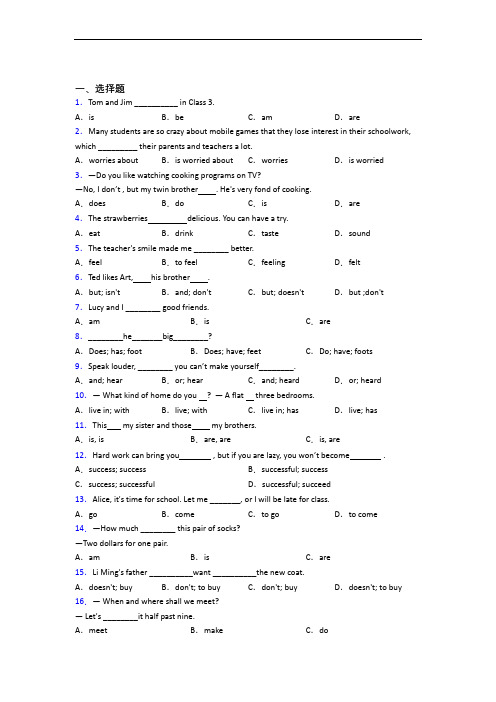
一、选择题1.Tom and Jim __________ in Class 3.A.is B.be C.am D.are2.Many students are so crazy about mobile games that they lose interest in their schoolwork, which _________ their parents and teachers a lot.A.worries about B.is worried about C.worries D.is worried 3.—Do you like watching cooking programs on TV?—No, I don’t , but my twin brother . He's very fond of cooking.A.does B.do C.is D.are4.The strawberries delicious. You can have a try.A.eat B.drink C.taste D.sound5.The teacher's smile made me ________ better.A.feel B.to feel C.feeling D.felt6.Ted likes Art, his brother .A.but; isn't B.and; don't C.but; doesn't D.but ;don't 7.Lucy and I ________ good friends.A.am B.is C.are8.________he_______big________?A.Does; has; foot B.Does; have; feet C.Do; have; foots 9.Speak louder, ________ you can’t make yourself________.A.and; hear B.or; hear C.and; heard D.or; heard 10.— What kind of home do you ? — A flat three bedrooms.A.live in; with B.live; with C.live in; has D.live; has 11.This my sister and those my brothers.A.is, is B.are, are C.is, are12.Hard work can bring you , but if you are lazy, you won’t become . A.success; success B.successful; successC.success; successful D.successful; succeed13.Alice, it's time for school. Let me _______, or I will be late for class.A.go B.come C.to go D.to come 14.—How much ________ this pair of socks?—Two dollars for one pair.A.am B.is C.are15.Li Ming's father __________want __________the new coat.A.doesn't; buy B.don't; to buy C.don't; buy D.doesn't; to buy 16.— When and where shall we meet?— Let's ________it half past nine.A.meet B.make C.do17.Our teachers always make us ________ a lot of homework.A.to do B.do C.does D.doing18.— How ________ your trip to Australia?—Great. I’ll go there again next year.A.was B.is C.are D.were 19.Nothing ______ difficult if you put your heart into it.A.is B.are C.am D.Be20.Let’s_________ and play football.A.go B.to go C.going21.The air _______ fresh after the rain. And the sky is blue.A.feels B.tastes C.smells D.sounds 22.Mike and Jeff________ TV on weekdays.A.doesn't watch B.don't watch C.watches D.not watch 23.Tom and I ________ good friends. He is twelve(12岁).A.are B.am C.is D.be24.________your brother________ a baseball?A.Do; have B.Does; has C.Does; have D.Do; has 25.—Do you know whom they will have ________the parts of car together?—Sorry,I have no idea.A.fix B.fixed C.to fix D.fixing【参考答案】***试卷处理标记,请不要删除一、选择题1.D解析:D【解析】【分析】【详解】句意:汤姆和吉姆都在3班。
七年级情态动词知识点归纳

七年级情态动词知识点归纳在英语学习过程中,情态动词是一个重要的语法知识点。
在初中阶段,七年级学生需要掌握情态动词的用法和意义,以便在口语和书写中运用自如。
本文将对七年级情态动词知识点进行归纳,帮助学生更好地掌握这个难点知识。
一、情态动词的定义和分类情态动词是一类助动词,用于表示能力、意愿、推测、建议等语气和含义。
常见情态动词包括can, could, may, might, must, shall, should, will和would。
其中,can, could, may, might, must表示推测或能力,shall, should, will和would表示意愿或建议。
二、情态动词的用法1. 表示能力:can, could, may, might, must例句:I can play basketball very well. 我打篮球很好。
2. 表示推测:can, could, may, might例句:He can be a doctor in the future. 他将来可能成为一名医生。
3. 表示必须或应该:must, should例句:You must study hard if you want to pass the exam. 如果想要通过考试你必须很努力学习。
4. 表示意愿或建议:shall, should, will, would例句:We should help others whenever we can. 我们应该在能帮助别人的时候伸出援手。
三、情态动词的否定和疑问形式1. 否定形式:在情态动词后加not例句:I cannot speak English fluently. 我不会流利地说英语。
2. 疑问形式:将情态动词放在主语前即可例句:Can you swim? 你会游泳吗?四、情态动词的常见搭配1. can/could + 动词原形:表示能力例句:I can speak Chinese fluently. 我能流利地说中文。
初中情态动词知识点归纳

初中情态动词知识点归纳1.情态动词的定义:情态动词是一类特殊的助动词,用来表示说话者对其中一种动作或状态的态度、意愿、能力、推测等。
2.情态动词的特点:a.情态动词本身没有人称和数的变化;b.后面一般不加动词的“s”形式;c.后面直接接动词原形。
3.情态动词的用法:a. 表示能力和可能性:can,could,may,might,shall,should,will,would;b. 表示命令和建议:shall,should,ought to,must;c. 表示义务和必须:must,should,ought to;d. 表示推测和可能性:may,might,could;e. 表示许可和禁止:may,can,mustn't,shouldn't;f. 表示愿望和要求:would like,would rather,should;g. 表示意愿和决心:will,would;h. 表示猜测和推测:could,might。
4.情态动词的否定形式:a. 在情态动词之后加not,构成否定形式,例如:can not,could not,may not,might not,shall not,should not,will not,would not等;b. 能力和意愿的否定形式:cannot,could not,may not,might not,will not,would not。
5.情态动词的疑问形式:b. 以情态动词开头的特殊疑问句:疑问词+情态动词+主语+动词原形,例如:What can she do? Where should we go? Who could help me?6.情态动词的省略:a.在与已知的情况一致时,情态动词可以省略;b. 在直接接不定式的情态动词后,可以省略to。
7.典型的情态动词搭配:a. can/could: 表示能力和可能性,例如:I can swim. He could play the piano when he was young.c. must: 表示推测和肯定,例如:She must be at home. You must be tired after such a long journey.d. should: 表示建议和应该,例如:You should study hard. She should go to bed early.e. will/would: 表示意愿和将要,例如:I will help you. He would like to go to the park.以上是初中情态动词的知识点归纳。
(完整版)情态动词知识点总结

(完整版)情态动词知识点总结什么是情态动词情态动词(Modal verb)是一种特殊的动词形式,用来表示说话人对某种行为、情况或可能性的态度、观点、意愿、能力等。
情态动词可以用来构成陈述句、疑问句、否定句、建议句等。
常用的情态动词及其用法1. Can:表示能力、许可、可能性、请求等。
Can:表示能力、许可、可能性、请求等。
- 表示能力:I can swim.(我会游泳。
)- 表示许可:Can I use your phone?(我可以用一下你的手机吗?)- 表示可能性:He can be late.(他可能会迟到。
)- 表示请求:Can you help me?(你能帮我吗?)2. Could:表示过去的能力、请求、建议等。
Could:表示过去的能力、请求、建议等。
- 表示过去的能力:When I was young, I could run faster.(我年轻的时候,跑得更快。
)- 表示请求:Could you please pass me the salt?(你能给我递一下盐吗?)- 表示建议:You could try using a different approach.(你可以尝试用一种不同的方法。
)3. May:表示可能性、许可、祝愿等。
May:表示可能性、许可、祝愿等。
- 表示可能性:It may rain tomorrow.(明天可能会下雨。
)- 表示许可:May I use your bathroom?(我可以使用你的卫生间吗?)- 表示祝愿:May you have a happy birthday!(祝你生日快乐!)4. Might:表示可能性、建议、推测等。
Might:表示可能性、建议、推测等。
- 表示可能性:She might be at home.(她可能在家。
)- 表示建议:You might want to consider another option.(你可以考虑另一个选项。
新初中英语语法知识—情态动词的知识点总复习含解析
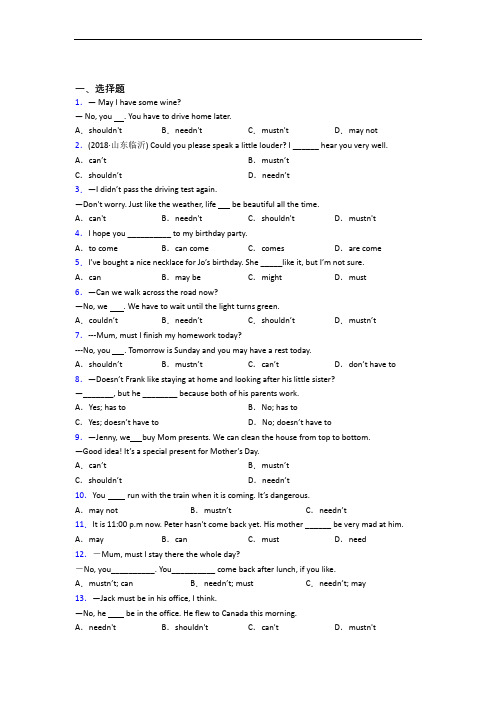
一、选择题1.— May I have some wine?— No, you . You have to drive home later.A.shouldn't B.needn't C.mustn't D.may not 2.(2018·山东临沂) Could you please speak a little louder? I ______ hear you very well. A.can’t B.mustn’tC.shouldn’t D.needn’t3.―I didn’t pass the driving test again.―Don't worry. Just like the weather, life be beautiful all the time.A.can't B.needn't C.shouldn't D.mustn't4.I hope you __________ to my birthday party.A.to come B.can come C.comes D.are come 5.I’ve bought a nice necklace for Jo’s birthday. She _____like it, but I’m not sure.A.can B.may be C.might D.must 6.—Can we walk across the road now?—No, we . We have to wait until the light turns green.A.couldn’t B.needn’t C.shouldn’t D.mustn’t7.---Mum, must I finish my homework today?---No, you . Tomorrow is Sunday and you may have a rest today.A.shouldn’t B.mustn’t C.can’t D.don’t have to 8.—Doesn’t Frank like staying at home and looking after his little sister?—_______, but he ________ because both of his parents work.A.Yes; has to B.No; has toC.Yes; doesn’t have to D.No; doesn’t have to9.—Jenny, we buy Mom presents. We can clean the house from top to bottom.—Good idea! It’s a special present for Mother’s Day.A.can’t B.mustn’tC.shouldn’t D.needn’t10.You run with the train when it is coming. It’s dangerous.A.may not B.mustn’t C.needn’t11.It is 11:00 p.m now. Peter hasn't come back yet. His mother ______ be very mad at him. A.may B.can C.must D.need12.-Mum, must I stay there the whole day?-No, you__________. You__________ come back after lunch, if you like.A.mustn’t; can B.needn’t; must C.needn’t; may 13.—Jack must be in his office, I think.—No, he be in the office. He flew to Canada this morning.A.needn't B.shouldn't C.can't D.mustn't14.— Must I finish the homework now?— .You can do it later.A.No, you needn’t B.Yes, you must C.No, you can’t15.The flowers ________ every day, or they will die.A.must water B.can be wateredC.should water D.must be watered16.— Must I go home? — No, you ________.A.can’t B.mustn’t C.don’t D.needn’t17.— Will Jim come to Yangzhou for a holiday?— He ________come, it depends on how much homework he will have.A.may B.should C.must D.need18.Will you please________them________the Birdwatching Society?A.inviting; join B.to invite; to join C.invite; to join D.to invite; join 19.—________ David be the new chairperson of the Students’ Union?—He _______ be, but I’m not sure.A.Can; can’t B.Can; mayC.May; must D.May; mustn’t20.Even the top student can't work out this problem, so it________ be too difficult.A.must B.may C.can D.need 21.—Could I call you by the first name?—Yes, you .A.will B.could C.may D.might22.-Could you help me with my English homework, Nancy?-Of course I____________. Glad to help.A.could B.can C.must D.do【参考答案】***试卷处理标记,请不要删除一、选择题1.C解析:C【解析】【分析】【详解】句意:——我可以喝一些酒吗?——不,你不可以。
- 1、下载文档前请自行甄别文档内容的完整性,平台不提供额外的编辑、内容补充、找答案等附加服务。
- 2、"仅部分预览"的文档,不可在线预览部分如存在完整性等问题,可反馈申请退款(可完整预览的文档不适用该条件!)。
- 3、如文档侵犯您的权益,请联系客服反馈,我们会尽快为您处理(人工客服工作时间:9:00-18:30)。
A.may not beB.won’t beC.couldn’t beD.will be
18.—The food ________be delicious . You ate it up .
—You bet . My mum cooked it for me .
A.can’t; canB.must; mustC.can; have toD.mustn’t; can
5.—Is that Kate’s green bike?
—It ____________be hers. She likes pink.
A.can’tB.couldC.mustn’tD.might
【详解】
句意:你已经完成了大部分工作,所以你明天不必这么早就开始工作。你可以9点来。
本题考查情态动词。can't不可能,mustn’t禁止,needn’t不必,couldn’t可能不。根据You have finished most of the work可知,你已经完成了大部分工作,因此明天不必这么早就开始工作,因此用needn’t,故选C。
9.B
解析:B
【解析】
【详解】
句意:——妈妈,我从快递公司收到了一个大箱子。它是什么?——我不确定。可能是你祖母送的礼物。
考查情态动词。should应该;might可能;must必须;will将,会。根据“I’m not sure”可知下文是没有把握的肯定推测。根据题意,故选B。
10.B
解析:B
【解析】
20.—We've prepared all kinds of foods for the picnic.
—Do you mean I___ bring anything?
A.can'tB.needn'tC.mustn'tD.won't
21.—________ David be the new chairperson of the Students’ Union?
must意为“必须,应该”,可以表示主观上一定要做什么或者肯定推测。例如:I must go home to look after my mum. This pair of shoes must be hers. may意为“可以,也许”,可以表示请求或者推测(无法断定)。例如:May I come in?It may be hers,but I’m not sure. need意为“需要”,既是情态动词也是行为动词。例如:You needn’t finish your homework right now. You need to tell him the truth. should意为“应该”,表示责任或者义务。例如:You should finish practising playing the piano at first.
6.—________your house be cleaned right now?
—No,it needn't.It may be cleaned this afternoon.( )
A.MustB.MayC.Can
7.A: Is Jim coming by train?
B: I’m not sure. He _______ drive his car.
【详解】
句意:火车来的时候你不能跟它一起跑,这很危险。
考查情态动词。may not可能不;mustn’t不能,表禁止;needn’t不需要。根据“It’s dangerous”及语境可知,此处是表达“你不能跟着火车跑”,在这儿应是不允许,强烈的禁止的意思,故用mustn’t。故选B。
11.C
解析:C
11.—The book report is very important. You ________ write it carefully.
—But I ________ hand it in now.
A.must; mustB.have to; must
C.must; have toD.have to; have to
—______. I have to make a plan for Clean-Up Day.
A.Sorry, I couldn’tB.Sorry, I can’t
C.Sure, I canD.Sure, I could
14.—Must I start now?
—No, you_______________.
句意:——你的房子必须现在打扫吗?——不,不必。可以今天下午打扫。
考查情态动词辨析。must必须;may可以;can能。根据下文回答needn't不必,可知,上文的一般疑问句中用助动词must表示“必须”。故选A。
【点睛】
情态动词must表示“必须”,由must引起的疑问句中,肯定答语用must,否定答语用needn’t或don’t have to,表示“不必”。
8.A
解析:A
【解析】
【详解】
句意:——Jenny,你一定不要挤上公共汽车。——对此我真的很抱歉。
考查情态动词。mustn’t禁止;needn’t不需要;may not可能不。根据you ___ push your way onto the bus.结合常识,可知是一定禁止挤上公共汽车,应该用mustn’t,故答案选A。
【分析】
【详解】
句意:——我经常看见Maria在图书馆,她一定最喜欢阅读。——是的。
16.(2017·甘肃白银·10)—I wonder if these are Danny's glasses.
—They________be Danny's. He doesn't wear glasses.
A.can'tB.mustC.mustn'tD.can
17.---I heard they went skating in the mountains last winter.
4.C
解析:C
【解析】
【详解】
句意:——你认为网上购物安全么?——我觉得是的。淘宝上,消费者可以无理由退货,但是他们要承担运费。
考查情态动词辨析。A. can’t; can不能,能;B. must; must必须,必须;C. can; have to可以,不得不;D. mustn’t; can禁止,能。根据句意表示的是顾客能退货,是可以,第一空用can;但是不得不承担运费,非主观情愿用have to。故选C。
2.A
解析:A
【解析】
【分析】
【详解】
句意:看这个标志!上面写道“禁止吸烟!“你不能抽烟。这是危险的。mustn’t禁止,不允许;ought not to不应该,不应当;needn’t不必;don’t have to不必。根据“No Smoking!”可知此处禁止吸烟,所以选A。
3.C
解析:C
【解析】
A.mustn'tB.can'tC.needn'tD.must
15.—Must I go out to have dinner with you, Mum?
—No, you, my dear. You’re free to make your own decision.
A.shouldn’tB.mustn’tC.needn’tD.can’t
12.—I often see Maria in the library, and she _________ like reading best.
—That’s right.
A.needB.mayC.mustD.can
13.—Could you please hang out with me this afternoon?
7.B
解析:B
【解析】
【详解】
句意:——吉姆坐火车来吗?——我不确定,他可能开自己的车。
考查情态动词辨析。A项,必须,一定,表示肯定推测;B项,也许,表示有可能;C项,需要;D项,应该。根据回答部分I’m not sure.可知,此处并不确定吉姆是开车来还是乘坐火车来,所以此处是“可能”。故选B。
【点睛】
—He _______ be, but I’m not sure.
A.Can; can’tB.Can; may
C.May; mustD.May; mustn’t
22.—Can you come to my party on Saturday afternoon?
—Sorry, I can’t. I ________ meet my friends.
5.A
解析:A
【解析】
【详解】
句意:—那是凯特的绿自行车吗?—那不可能是她的。她喜欢粉色。
考查情态动词用法。can’t不可能,不能;could能,构成过去式;mustn’t一定不要,表示禁止;might大概,可能。根据后一句凯特喜欢粉色可知,表示不可能,用can’t,故选A。
6.A
解析:A
【解析】
【详解】
A.mustn’tB.ought not toC.needn’tD.don’t have to
3.You have finished most of the work, so you ____ start working so early tomorrow. You may come at 9 :00.
A.can'tB.mustn'tC.needn'tD.couldn't
4.— Do you think it is safe to shop online?
— I think so. On Taobao, customersreturn goods with no questions asked,but they ______ pay delivery costs.
